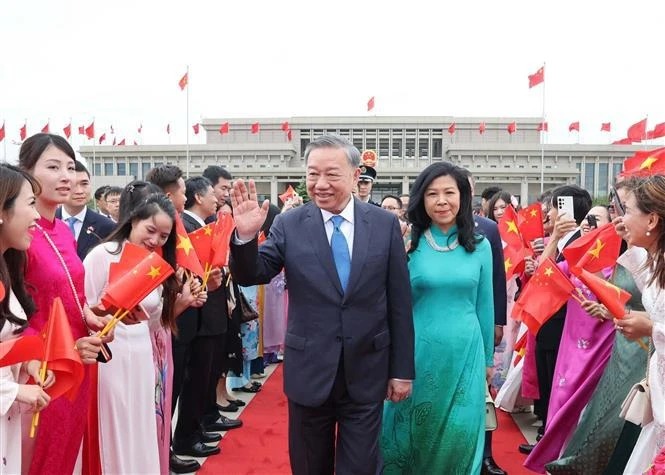Party General Secretary, State President wraps up state visit to China
General Secretary of the Communist Party of Vietnam Central Committee and State President To Lam, his spouse and a high-level Vietnamese delegation arrived in Hanoi on August 20, concluding a three-day state visit to China at the invitation of General Secretary of the Communist Party of China (CPC) Central Committee and President of China Xi Jinping, and his spouse.

General Secretary of the Communist Party of Vietnam Central Committee and State President To Lam, his spouse and a high-level Vietnamese delegation arrived in Hanoi on August 20, concluding a three-day state visit to China at the invitation of General Secretary of the Communist Party of China (CPC) Central Committee and President of China Xi Jinping, and his spouse.
The top leader and his entourage were seen off at Beijing Capital International Airport by member of the Secretariat of the CPC Central Committee, member of the State Council of the People’s Republic of China and Minister of Public Security Wang Xiaohong, Chinese Ambassador to Vietnam Xiong Bo, officials of the Chinese Ministry of Foreign Affairs, along with Vietnamese Ambassador to China Pham Sao Mai, and representatives from the Vietnamese community in the country.
During his stay, Lam held talks with his Chinese counterpart, witnessed the signing of cooperation documents between the two nations, attended a tea party, and met with Chairman of the Standing Committee of the National People's Congress of China Zhao Leji, Chairman of the National Committee of the Chinese People’s Political Consultative Conference Wang Huning, Chinese Premier Li Qiang, and Secretary of the Party Committee of Guangdong province Huang Kunming. He also had a meeting with representatives of friendship organisations, paid tribute to Chairman Mao Zedong at the memorial house dedicated to the late Chinese leader, visited and had a working session with the Central Party School of the CPC, and visited MEGVII technology company.
The Vietnamese leader, his spouse and the Vietnamese delegation paid floral tribute to martyr Pham Hong Thai at his grave in the Huang Hua Gang Memorial Park, and visited the relic site of the headquarters of the Vietnamese Revolutionary Youth League in Guangzhou city, Guangdong province. They also visited the Vietnamese Embassy, and met with the Vietnamese community in China.
At the talks and meetings, the two sides briefed each other on the situation of each Party and country, discussed and reached many important common perceptions on the relations between the two Parties and countries, as well as current international and regional issues. On this occasion, 14 cooperation agreements were signed between the two countries' ministries, sectors, agencies and localities.
The top leaders reached high consensus on strengthening political trust, maintaining regular exchanges and contact between high-level leaders of the two Parties and countries, attaching importance to the strategically guiding role of the Party channel to the overall bilateral relations, and continuing to deepen theory cooperation through mechanisms such as theory conference between the two Parties, sharing with each other the latest theoretical and practical achievements recorded by each Party and country in a timely manner, contributing to the cause of each Party and country.
They concurred to continue bolstering collaboration in security and defence, boosting economic, trade and investment cooperation, including the promotion of connectivity under the “two corridors, one belt,” “belt and road” initiatives, fostering rail and road infrastructure connections, strengthening cooperation in supply chain as well as economic cooperation among border localities, and increasing exchanges in the reform of State-owned enterprises.
Xi pledged that China is ready to increase imports of Vietnamese agricultural products, expand Vietnamese trade promotion offices in China, and provide favourable conditions for high-quality farm produce of Vietnam to reach its market.
The top Vietnamese and Chinese leaders agreed on the necessity of further enhancing people-to-people exchanges, promoting mutual understanding and friendship between the two countries' people, especially the youth. They agreed to designate 2025 as the “Year for Vietnam-China Humanistic Exchange”.
The leaders also touched upon international and regional issues of shared concern, stressing the coordination and mutual support at multilateral forums and international mechanisms for the legitimate interests of the two countries, making positive contributions to the common interests of the international community.

